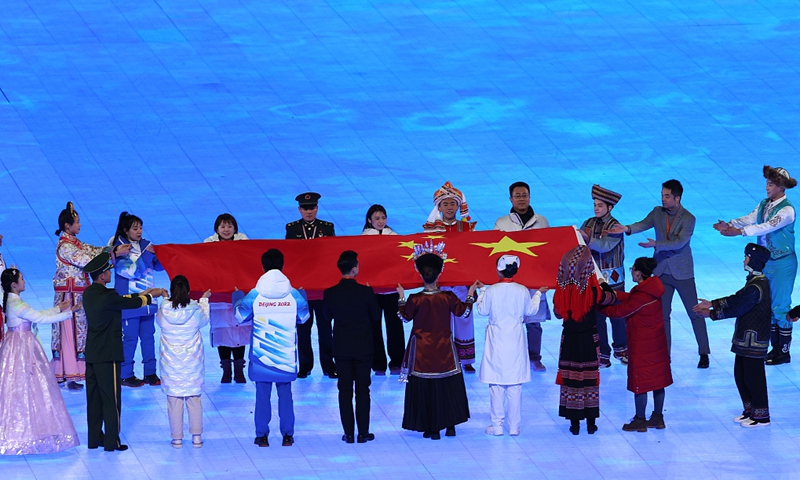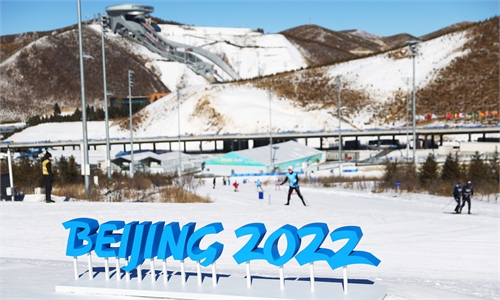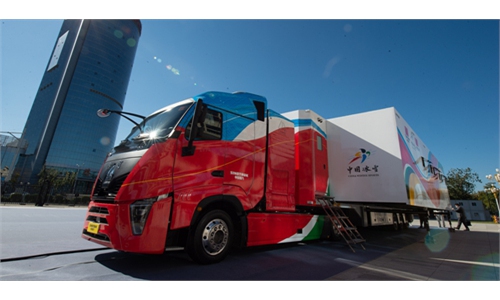Culture and feelings of China's Korean ethnic minority should be respected and so-called 'cultural appropriation' is groundless: Chinese Embassy in Seoul

People pass Chinese national flag at the opening ceremony of the Beijing 2022 Winter Olympics Photo: Sina.com
The Chinese Embassy in South Korea said in a statement on its official WeChat account on Tuesday that accusations of "cultural appropriation" for China's Korean ethnic minority at the opening ceremony of the Beijing Winter Olympics wearing ethnic costumes are groundless. China respects the history, culture and traditions of South Korea and hopes that the feelings of all ethnic groups in China, including the Korean ethnicity, can be respected.
The statement from the Chinese Embassy in Seoul stressed that China is a multi-ethnic country composed of 56 ethnic groups. It is not only their wish but also their right for representatives of all ethnic groups to wear their ethnic costumes at the opening ceremony of the Beijing Winter Olympic Games, an international sports event and major national event.
A Chinese girl dressed in the traditional costume of China's Korean ethnic minority appeared among those representing China's 56 ethnic groups during the opening ceremony of the Beijing Winter Olympics on February 4, sparking controversy in South Korea.
Some South Korean politicians and activists criticized what they called China's "cultural appropriation" and "cultural engineering" for the appearance of Korean ethnic elements in the opening ceremony of the Beijing Winter Olympics.
"We deeply regret that the Hanbok [the traditional Korean costume used in South Korea] appeared among the costumes of Chinese minorities at the opening ceremony of the Beijing Winter Olympics," South Korean ruling party lawmaker, Lee So-young, wrote on her Facebook page on Saturday, according to media report.
"This is not the first time China has introduced Korean culture as if it were its own. [...] If the anti-China sentiment of the Korean people becomes stronger by leaving this issue as is, it will be a big obstacle when conducting diplomacy with China in the future," Lee said.
A number of South Korean politicians also spoke out in recent days calling for respect and understanding toward both cultures. National Assembly Speaker, Park Byeong-seug, who attended the opening ceremony in Beijing, said that the "Hanbok is one of the most representative elements of South Korean culture, no one would doubt this, and the South Korean people need to be proud of its culture."
However, Park noted that, as around 120 million people belong to 55 ethnic minorities in China, there also is a need to understand and respect the Chinese culture. He added that both countries should respect each other's inherent culture, especially during this trip to Beijing. Park further highlighted the need to improve the understanding of diversity, and the urgency to open the market for cultural content.
According to data from the National Bureau of Statistics of China, China is home to nearly 2 million people from Korean ethnicity, which is a recognized minority group whose language and culture are granted official protection by the Chinese government.
The Chinese Embassy also stressed that ethnic Koreans in China and both sides of the Korean Peninsula are of the same root and share the same heritage, including traditional ethnic costumes.
The South Korean Foreign Ministry official also said on Sunday that they will develop more understanding toward each other, based on mutual respect for their culture and diversity, and will continue to do so in the future.
Hwang Hee, Minister of Culture, Sports and Tourism of South Korea, who also attended Friday's opening ceremony in Beijing, said his government had no plans to officially file a complaint to Beijing over the costume issue, but added that while the costume was intended to highlight the Korean ethnicity in China, it "may create unfortunate misunderstandings" between the two countries.
The Chinese Embassy said that this year marks the 30th anniversary of the establishment of diplomatic relationship between China and South Korea and is also the year of cultural exchange between the two countries. It is hoped that the two sides will work together to deepen cooperation, promote friendship between both peoples and strive for further progress in bilateral relations.



